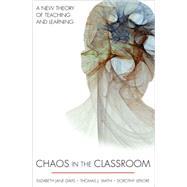
Note: Supplemental materials are not guaranteed with Rental or Used book purchases.
Purchase Benefits
Looking to rent a book? Rent Chaos in the Classroom [ISBN: 9781594604072] for the semester, quarter, and short term or search our site for other textbooks by Davis, Elizabeth Jane; Smith, Thomas J.; Leflore, Dorothy. Renting a textbook can save you up to 90% from the cost of buying.
| Introduction | |
| The Nonlinear Dynamic Theory of Learning | p. 3 |
| A New Theory | p. 3 |
| Why Do We Need a New Theory of Learning? | p. 4 |
| Beginning with Critical Thinking for Every Child | p. 5 |
| Chaos Theory As a Window to the Learning Process | p. 7 |
| Sensitive Dependence on Initial Conditions | p. 8 |
| Iteration | p. 10 |
| Self-Similarity (Fractals), Catastrophe Shelves, Density and Strange Attractors | p. 13 |
| Summary | p. 18 |
| Brain-Based Teaching Theory | p. 21 |
| Each Brain Is Unique | p. 21 |
| Brains Are Globally Stable but Locally Flexible, Incredibly Complex, Are Uniquely Shaped by Experiences, and Maintain Their Ability to Restructure Themselves throughout Life | p. 23 |
| Emotions Are Critical to the Restructuring Process | p. 25 |
| Brains Act to Create Meaning through a Process of Compare/Contrast and Patterning | p. 27 |
| Brains Create Meaning within Contexts | p. 29 |
| Summary | p. 31 |
| Finding the Strange Attractor | p. 33 |
| The Structure Underlying Chaos | p. 33 |
| Graphing the Strange Attractor | p. 34 |
| The Didactic Lesson | p. 37 |
| A Random Discussion | p. 42 |
| Summary | p. 47 |
| Headfirst and on Purpose | p. 49 |
| Over the Catastrophe Shelf | p. 49 |
| The First Class | p. 50 |
| The Second Class | p. 52 |
| The Third Class | p. 56 |
| Headfirst and on Purpose | p. 65 |
| Summary | p. 71 |
| Creating Chaos and Loving It | p. 73 |
| Implications for Teachers | p. 73 |
| Chaos Theory As a Window to the Learning Process | p. 74 |
| What Is a Catastrophe Shelf and How Do We Get Students on One? | p. 78 |
| Summary | p. 88 |
| References | p. 89 |
| Index | p. 91 |
| Table of Contents provided by Blackwell. All Rights Reserved. |
The New copy of this book will include any supplemental materials advertised. Please check the title of the book to determine if it should include any access cards, study guides, lab manuals, CDs, etc.
The Used, Rental and eBook copies of this book are not guaranteed to include any supplemental materials. Typically, only the book itself is included. This is true even if the title states it includes any access cards, study guides, lab manuals, CDs, etc.